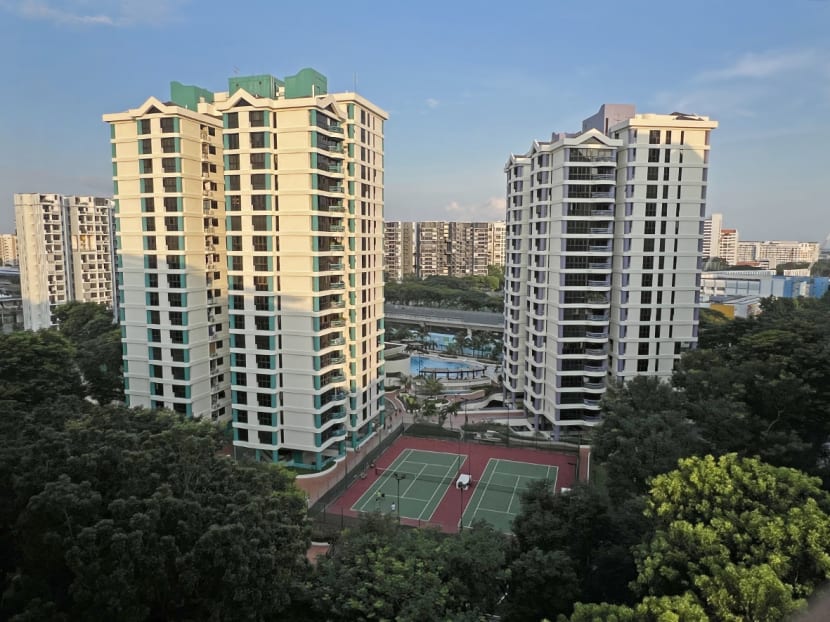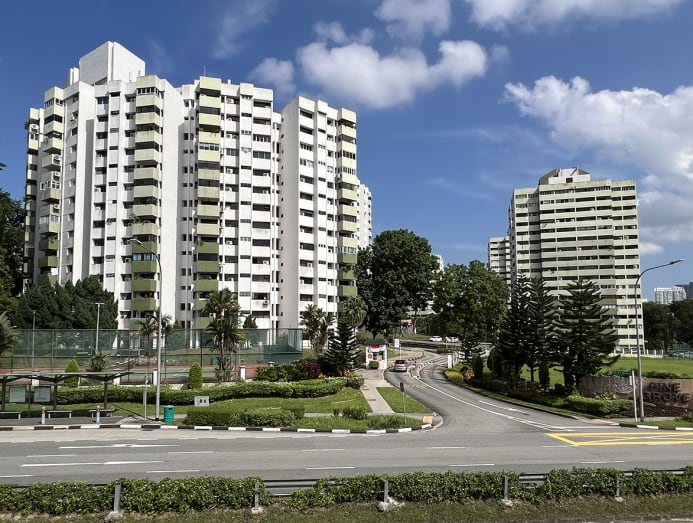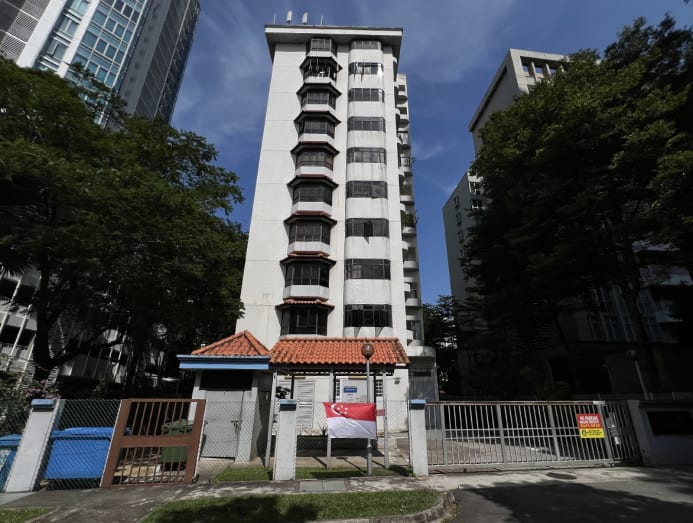Years after the en-bloc boom, tensions simmer between condo neighbours over failed bids to sell

The Tanamera condominium along New Upper Changi Road failed to launch a collective sale in all three of its attempts.
SINGAPORE — It has been about a year since Helen was caught up in her condominium estate's last collective sale attempt but even today, she avoids interacting with some of her neighbours.
The 48-year-old freelancer, who wished to be known only by her first name, has been living at Pine Grove for two years. Last year, she felt pressured to agree to the estate's fifth and latest failed attempt at passing an en-bloc agreement — because her neighbours who were for the collective sale of their condo had been talking her up almost daily.
"They just kept talking to me every day and convincing me to sign the deal, so I did in the end," she said.
"But I think I did it out of pressure because I've only been living here for (two years) and I would need to pay (seller's stamp duty) if I did not meet the minimum occupancy period."
Helen's situation may sound awkward, but some have had it worse.
Mr Pooba Mahalingam served as chairman for the collective sales committee at The Tanamera condominium along New Upper Changi Road during its first two failed attempts to launch a collective sale in 2017 and 2019.
He said that some residents thought that he had a hidden agenda to profit from the role.
"Some residents can be quite nasty. Some wrote long messages scolding me and cursing me for trying to kick them out of their homes," he said.
The Tanamera failed to launch a collective sale in all three of its attempts, the latest being in 2023, because it did not secure the required 80 per cent of signatures from residents.
This has resulted in a "cold war" of sorts and strained relations between some residents, Mr Mahalingam added.
When condominium en-bloc sales fail to launch, a once harmonious residential community can be left in turmoil, with feelings of disappointment and resentment among neighbours.
In some cases, hostilities erupt in the open, with owners opposing the sale venting their feelings on the marketing agent and those in favour. They resent feeling pressured to agree to sell.
For their part, those who championed the en-bloc effort are left grappling with the sometimes crushing disappointment of their efforts coming to naught. As tensions simmer, the estate can be plunged into division.
These powerful emotions are unleashed as some people want to sell for reasons such as downsizing or upsizing or perhaps getting some cash from the sale, while others want to remain living in a place they have loved for years, even decades.
En-bloc sales in Singapore can be launched if a certain proportion of the owners, as measured by their property's share value and strata value, agree to put a private property on the market. This is usually 80 per cent, or 90 per cent for properties less than 10 years old.
In other words, a relatively small proportion of owners can stymie efforts for an en-bloc sale, also known as a collective sale.
In recent years, several condominium en-bloc attempts have failed as property market sentiment slowed after the last bout of en-bloc fever in 2017 and 2018, partly due to stringent government measures to cool the property market in recent years.
Some developments such as Kensington Park in Serangoon in 2023 successfully secured the 80 per cent threshold but failed to attract any bids from property developers above its S$1.28 billion reserve.
Two earlier attempts also failed. In 2018, the estate failed to garner the requisite percentage of signatures. Its second attempt successfully launched in 2022 but also failed to attract any bids.
Such repeated setbacks at various condominiums have left many residents grappling with disappointment, frustration and bitterness — turning the dream of a profitable sale by some owners into a lingering source of contention within the estate.
Against this backdrop, some residents from three condominiums that TODAY visited — Pine Grove, Mar Thoma Mansions and The Tanamera — highlighted the tensions that have arisen between the pro- and anti-en-bloc camps in their estates.

TENSIONS AND AWKWARDNESS
A resident of Pine Grove who wished to be known only as Mr Tan and who was against the estate being put up for sale, said that he felt like the pro-en-bloc residents were chasing him out of the home he has been living in since 1994.
"I didn't attend any of the EOGMs (extraordinary general meetings). I'm quite sick of it and I have been living here for so long. Nowadays, I just try to avoid (the pro-en-bloc residents) wherever I can," the 68-year-old said.
On the other side of the fence, Ms Jan, a 64-year-old nurse who has lived in Mar Thoma Mansions since 1996, said that she was disappointed when the latest tender, which closed in June this year, fell through because she had planned to downgrade to a resale flat to live closer to her ageing mother.
Mar Thoma Mansions failed in its first attempt at an en bloc in 2020 due to insufficient signatures needed for approval. The latest tender garnered 80 per cent of residents' signatures, but did not attract bids to meet the reserve price of S$54.7 million.
"I'm disappointed because the estate is in shambles and it's time (to move out). And as a nurse, I want to be able to care for my mum in her older years. I'm still holding out hope with this private treaty, but if it's unsuccessful, I'll continue to live here and see if we can relaunch again," she said.
Ms Jan also said that tensions flared within the small estate of 18 units when some residents were reluctant to sign off on the collective sale launch in 2020, which fell through.
"I don't want to say much, but there were tensions as some neighbours were quite stubborn and disputes are unavoidable in such a small estate. They only signed this time when they stood to gain about S$3 million," she added.
The estate is now in the private treaty stage, where the collective sales committee and marketing agent have 10 weeks to look for prospective buyers and negotiate a deal with them.
To be sure, en-bloc sales have long been a source of tension and hostility among neighbours, even during boom years.
Mr Luqman Hakim, chief data and analytics officer at real estate outfit 99.co, recalled the tensions between pro- and anti-en-bloc camps in Laguna Park condo in Marine Parade in 2008.
Hostilities "were so extreme and divisive that it led to tit-for-tat vandalism on their own development with multiple police reports culminating into a court case".
"Understandably, the en-bloc process will generate a number of opinions among residents arising from their own motivations of what they want out of the property that they paid a lot of money for.
"These tensions get amplified the larger the development and number of residents," he added.

Indeed, property analysts told TODAY that there is often acrimony in a collective sale attempt, with relationships between neighbours souring when they find themselves on opposing sides.
Mr Alan Cheong, executive director for research and consultancy at property agency Savills Singapore, said: "Neighbours who could be on friendly terms with each other may find themselves in opposing camps and the relationship can deteriorate to a point where they are no longer on speaking terms or allow their children to play with each other."
He added that residents expressing stronger opinions may also find the utility of living in the estate diminished, given the discomfort of encountering opposing camps in shared areas.
Professor Sing Tien Foo, provost's chair at the department of real estate at NUS Business School, said that residents should respect the decisions and close ranks after the process, even if it is not easy to do so.
"Bitterness and acrimony may continue to affect them, and it will take time to mend their relationships and trust," he added.
As for how long the stagnation in the en-bloc market will continue, analysts agreed that the current impasse would likely persist into the next few years — largely due to the wide price gap between what owners expect and what developers are willing to pay.
Mr Lee Sze Teck, senior director of data analytics at property agency Huttons Asia, said that owners want a high price since the replacement cost for a home has gone up in recent years.
"With the higher ABSD (Additional Buyers' Stamp Duty) rates, investors and foreigners are not likely to vote in favour of an en-bloc sale," he said.
"This has led to many developments not being able to achieve the required consent to launch a sale. For those that were launched, some of the asking prices were unrealistic as well."
The current ABSD rate for Singaporeans who want to buy a second property is 20 per cent, while permanent residents are subject to a rate of 30 per cent. Foreigners must pay 60 per cent.
For those looking to downgrade to a Housing and Development Board flat, another hurdle is the 15-month wait-out period to buy a five-room flat or larger, imposed by the Government in 2022 to keep resale flats affordable.
Mr Benjamin Poh, senior division director at property firm ERA, said: "Most owners of these old estates, which are larger in size, are very reluctant to downgrade to a four-room flat, because they are used to living in bigger spaces with amenities."
Mr Cheong from Savills said that the spaciousness of these residents' developments is unrivalled by newer projects. This may include large gardens, more space between each apartment block and generally low-density developments.
Even so, Mr Hakim of 99.co said that the en-bloc market will continue to be relevant in Singapore given the country's limited land supply.
"Developers are acutely aware that buyers nowadays are also exercising financial prudence in a high-interest-rate environment and economic uncertainties," he added.
"However, unlike previous years especially in 2017 and 2018, developers are also more conscientious about their acquisitions."
Agreeing, Prof Sing of NUS Business School said that residents need to adjust their pricing expectations when trying to attract bids from property developers for their estates.
"The expectation of en-bloc buyers will need to be adjusted to improve the appeal of en-bloc redevelopment for private developers and the recovery (of the market) will ultimately depend on the pricing expectation of the en-bloc owners."
SALES IN THE EN-BLOC MARKET OVER THE YEARS
In 2017, Singapore saw robust sales in the en-bloc market with 31 deals totalling S$8.5 billion.
It was an even stronger year in 2018 with 36 deals amounting to S$10.3 billion.
However, recent years have witnessed a significant decline and stagnation in the number of collective sales.
- In 2020, there were only five sales worth S$138.98 million
- In 2021, a total of 12 sales racked up S$2.19 billion in proceeds
- In 2022, there were 14 sales worth S$3.67 billion
- In 2023, there were eight sales valued at S$1.39 billion
- So far in 2024, there has been just one sale worth S$439 million
The data was provided by property firm ERA.
The sole successful sale so far this year was Delfi Orchard, a mixed-use commercial development on Orchard Road, which includes 23 apartments.
Property analysts told TODAY that the stagnation of the en-bloc market is expected to persist through the rest of 2024 and into the next year.
The market is being saturated by an increasing number of older residential developments trying to secure collective sales, in the midst of challenging market conditions and regulatory hurdles that continue to dampen investor enthusiasm.









